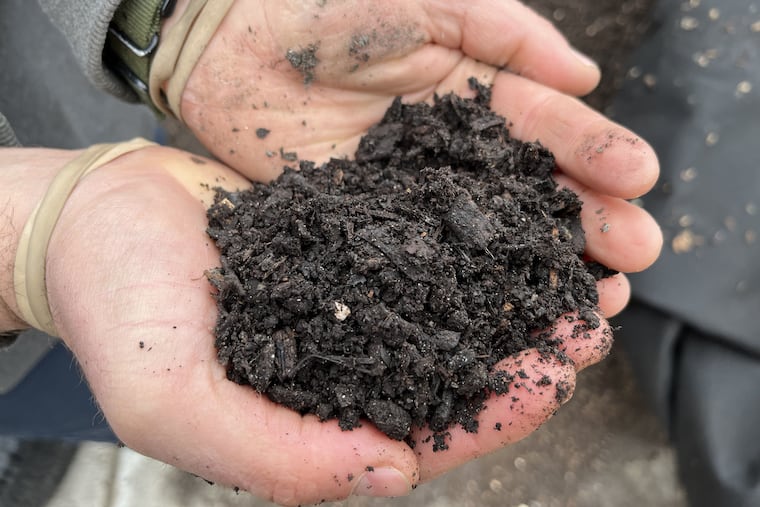Philly is turning discarded hamburgers, chicken salad, lettuce into tons of compost
Each of the city's recreation centers generates nearly a ton of food waste each year that can be broken down into compost, officials estimate.

A large pile of compost at a city-owned facility was steaming one day last week, the result of heat produced by millions of microbes feeding on food waste from city rec centers.
The newly operational facility on Rising Sun Avenue in Northeast Philadelphia is the result of plans laid before the pandemic to turn tons of food waste generated at the city’s 156 recreation centers into free compost for registered community gardens.
Rec centers serve meals during programs for children and the elderly. Each center generates nearly a ton of food waste each year, officials estimate.
» READ MORE: Philly to compost 150 tons of waste a year from meals served at rec centers
Though the compost facility, which is not open to the public, started accepting waste in November, the material is just now turning into usable soil.
The process takes about five months as the waste is collected, screened and moved by stage of decomposition through a series of eight concrete block bays. Some of the bays are fed by a blower and pipes that circulate air, helping with an aerobic process that can produce temperatures of 140 to 160 degrees to kill harmful pathogens generated by decomposing meat and dairy.
Money saving idea
“The latest recipe we’ve been using is a blend of food waste, sawdust and wood chips all sourced from within Philadelphia,” said Tim Bennett, owner of Bennett Compost, which won the bid to haul the waste to a former maintenance facility owned by Parks and Recreation and turn it into compost.
Under the arrangement, Bennett uses the facility for his own business collecting food waste from city homes. His workers mix that with the waste from the rec centers. Bennett, which also has other facilities, sells compost back to his customers at a discount.
» READ MORE: Entrepreneurs have figured out how to profit by pedaling to pick up food scraps
In turn, Bennett hauls the waste from the rec centers for free.
The compost will go to 18 registered community gardens, as well as the Sankofa Community Farm at Bartram’s Garden and some high schools, said Ash Richards, urban agriculture director for Parks and Recreation. The compost gets delivered loose to the community gardens.
The program is separate from the existing Fairmount Park Organic Recycling Center where residents can get free compost made from leaves and manure from plant-eating animals — but not food waste, which takes a more intensive level of attention to ensure it is safe to use.
The idea to compost food waste had its genesis in Mayor Jim Kenney’s former Zero Litter and Waste Cabinet, which was disbanded during the pandemic. But Parks and Recreation proceeded with the project and began teaching children in fall 2021 how to separate their food waste for collection at the rec centers.
10 tons so far
The project has been funded, in part, by a $50,000 from the U.S. Environmental Protection Agency for Bennett Composting to build the concrete bays and $90,000 from the U.S. Department of Agriculture for education and engagement at the rec centers.
Officials say they hope to eventually incorporate other Parks and Recreation properties, such as the Dell Music Center, or events such as the Philadelphia Marathon, into the program.
“But we’re still at year one,” Richards said.
Natalie Walker, sustainability director for Parks and Recreation, said 50 recreation centers are currently participating with the goal of folding in 25 more centers each year.
Parks and Recreation serves 2.1 million meals to youth each year through summer camps and 120 after-school programs, and up to 200,000 meals to older adults. Meals range from breakfast and lunch served at the camps to later meals served during the after-school and older-adult programs. The School District serves the most meals to kids but does not have a food-waste recycling program.
“So far, Tim (Bennett) and his team have collected about 10 tons of food waste in a year and half,” Walker said. “And that will continue to grow as we onboard new sites.”
Bennett said the process has gotten easier as newer rec centers are added.
“They have other rec centers to learn from who have been doing it for a while,” he said. “So the newer sites coming on are diverting their food waste faster. The first cohort took a bit longer. We’ve really seen the new ones hit the ground running.”
‘Good overall for the environment’
Mark Smith, leader of the Roots Garden at Fisher Park in the Olney neighborhood, said the garden opens this weekend and he’s looking forward to the food waste compost. The garden also gets vegetative compost from the city.
“We’re excited about getting this compost,” Smith said. “When you look at composting ideas, tips and tricks, you learn this is the kind of compost that you want. And it’s good overall for the environment because you’re taking scraps that would have been just thrown in the garbage.”